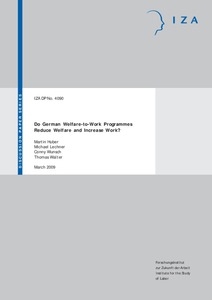Do German welfare-to-work programmes reduce welfare and increase work?

Huber, Martin ; Lechner, Michael ; Wunsch, Conny ; Walter, Thomas
Institute of Labor Economics, Bonn
IZA - Bonn
2009
39 p.
activation ; labour market reform ; programme evaluation ; welfare state
Discussion Paper Series
4090
Labour market
English
Bibliogr.
"Many Western economies have reformed their welfare systems with the aim of activating welfare recipients by increasing welfare-to-work programmes and job search enforcement. We evaluate the three most important German welfare-to-work programmes implemented after a major reform in January 2005 ("Hartz IV"). Our analysis is based on a unique combination of large scale survey and administrative data that is unusually rich with respect to individual, household, agency level, and regional information. We use this richness to allow for a selection-on-observables approach when doing the econometric evaluation. We find that short-term training programmes on average increase their participants' employment perspectives and that all programmes induce further programme participation. We also show that there is considerable effect heterogeneity across different subgroups of participants that could be exploited to improve the allocation of welfare recipients to the specific programmes and thus increase overall programme effectiveness. "
Digital
The ETUI is co-funded by the European Union. Views and opinions expressed are however those of the author(s) only and do not necessarily reflect those of the European Union or the ETUI.